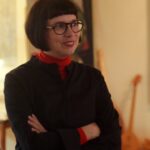Renée Turner is an artist and writer whose practice engages with digital narratives, archives, and interdisciplinary collaborative inquiry. Her research is informed by feminist perspectives, and the entanglement of sites, histories, material encounters, and embodied subjectivities. She is a Senior Research Lecturer at the Willem de Kooning Academy and a researcher within the Rotterdam Arts and Science Lab (RASL)
On hybridity, team teaching & creative friction
SMcD: How does transdisciplinarity manifest itself within your teaching?
RT: My background is quite mixed in terms of education. As an undergraduate, I attended a liberal arts university with a core curriculum of literature, history, philosophy, theology, economics, politics, science, mathematics, language and fine arts. Also, next to an MFA, I have an MA in Creative Writing and New Media and was in the Theory program at the Jan van Eyck Academie in Maastricht. I bring that hybridity (or some might say confusion) into my teaching. I often joke I’m the master of none but a mistress of many.
I also do a lot of team teaching. For example, within the Master Education in Arts program at the Piet Zwart Institute, I’ve taught Critically Committed Pedagogies with Prof. Frans-Willem Korsten, who is Endowed Professor at Erasmus School of Philosophy and Senior University Lecturer at the Leiden University Centre for the Arts in Society. We didn’t just divide tasks across disciplinary lines but created a flow where our knowledge rubbed together (maybe creative friction, I suppose). And I think students saw our differences and witnessed our attempts at grappling with our respective disciplinary vocabularies. There was a lot of: When you say this, do you mean that? That kind of negotiation, questioning of assumptions and slowing down to unpack things gives space for mutual and horizontal learning. Although team teaching poses challenges and certainly isn’t built for speed, especially when done across disciplines, it’s nonetheless profoundly rewarding.
Preparing food and eating together during Critically Committed Pedagogies.
On embracing limits, assessment, Swiss Army knives, neoliberalism, process over product, values
SMcD: What do you see as the key component of transdisciplinary education?
RT: This might sound counter-intuitive, but I’ve been thinking a lot about why someone would engage in a transdisciplinary endeavour in the first place. What would make a person reach out beyond their discipline? And I’ve been reflecting on the role of limits. If you look at most assessment criteria, they are often centred around the capacity to “do” this or that. Someone can critically reflect, contextualize, select the appropriate media, communicate to a broader public etc. But we rarely talk about limits. So how could we encourage students to recognize limitations? In other words, acknowledge that particular projects, questions or lines of inquiry, might require the input of others. And in identifying those limits, acquire the skills to seek out others with whom they can consult and collaborate. It’s about acknowledging that any discipline or individual has only a partial perspective, and there is always *not* knowing involved.
SMcD: Ah yes, like Donna Haraway’s ideas around situated knowledge and partial perspectives. Areas of not knowing are difficult to admit within the academy where expertise is valorized, especially as you move through the university levels. 1
RT: Exactly.
SMcD: And the question is how to create a space for that vulnerability.
RT: Maybe it’s about fostering confidence in discomfort. I take that back; I’m not sure confidence is the right word. It’s about navigating discomfort and embracing that we all work from partial knowledge and that there is no road map within transdisciplinary education. We piece together bodies of knowledge to create layered views, complexity and even contradiction. And bodies of knowledge are enfolded into and generated from the embodied. That’s yet another layer where the individual and collective come together.
SMcD: This raises the issue of assessments and how might these qualities be integrated.
RT: Oh, it’s interesting that you bring up this point. Recently, I watched an interview with Susan Orr, Dean of Learning, Teaching and Enhancement and Professor of Creative Practice Pedagogy at University of the Arts London. 2 She talks about assessments as value-setting mechanisms, and we need to ask ourselves as educators what values we are concretizing when setting criteria. I think that’s an interesting question to think about in relation to transdisciplinary education. It’s easy for transdisciplinary education to promise a kind Swiss Army Knife for today’s so-called wicked problems. To my mind, we should avoid neo-liberal ideas of transdisciplinarity that tend to reproduce rather than transform and accept the terms of conditions of wicked problems. I find the awkwardness, vulnerability, acknowledgement of limits and the need to reach out to others, to be the promise of transdisciplinary education. I ask myself how assessments might support these qualities. This is not just a matter of writing new criteria that avoid extractionist models but looking at forms of evaluation that cherish the individual, the collective and processes of engagement and agency over products and outputs.
- Haraway, Donna. “Situated Knowledges: The Science Question in Feminism and the Privilege of Partial Perspective.” Feminist Studies 14, no. 3 (1988): 575–99. https://doi.org/10.2307/3178066.[↩]
- https://vimeo.com/458640666[↩]
